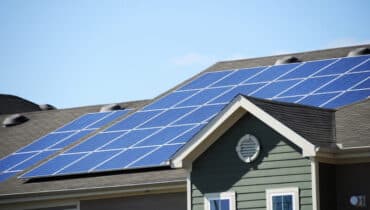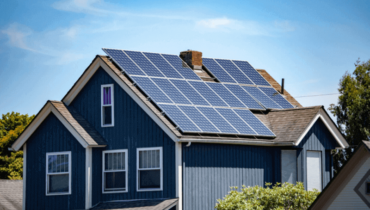Table of Contents
Off-grid solar systems have revolutionized the way we generate and consume energy, offering a sustainable and independent power solution. In this comprehensive guide, “The Ultimate Off-Grid Solar System Guide,” we will delve deep into the world of off-grid solar systems. From understanding the fundamentals to making informed choices, this guide will equip you with the knowledge and insights you need to embrace a self-reliant energy future.
Off-grid solar systems have gained immense popularity in recent years as a sustainable and self-reliant energy solution. In this comprehensive guide, we will explore the various components, benefits, and considerations involved in setting up the best off-grid solar system for your energy needs.
Understanding Off-Grid Solar Systems
Off-grid solar systems are stand-alone power solutions designed to function independently of the traditional electrical grid. They harness energy from the sun through solar panels, store it in batteries, and convert it to usable electricity with an inverter. These systems are ideal for remote locations and provide energy independence and sustainability. Understanding their components and operation is key to making the most of off-grid solar technology.
Off-grid solar systems, also known as standalone solar systems, are designed to provide power in remote areas or locations where connecting to the grid is either impossible or too costly. These systems use solar panels, batteries, and inverters to generate, store, and distribute electricity.
Best Four Off-Grid Solar Systems
- Starter Kit with 1 Pcs 100W Monocrystalline Panel and 30A PWM Controller Solar Charging, Boats, RV, Off-Grid System Energizer 1100Watt Pure Sine Wave Power Inverter 12V DC to 110V
- 120V Converter for Family RV Off Grid Solar System Car & 8-Amp Battery Charger/Maintainer
- 20W 12V Solar Panel Kits with Adjustable Mount Brackets + 10A MPPT Charge Controller + SAE Battery Clip Cable for Car RV Trailer Marine Off-Grid System
1. KIT-STARTER-100D Starter Kit with 100W Monocrystalline Panel:
- This starter kit includes a 100W monocrystalline solar panel, which is known for its efficiency and durability.
- The 30A PWM controller manages the charging process and ensures your batteries are charged efficiently.
- Perfect for those starting with off-grid solar systems, such as in RVs and boats.
2. Energizer 1100W Pure Sine Wave Power Inverter:
- This inverter, like the Renogy inverter, converts 12V DC power into 120V AC power, ensuring clean and stable electricity.
- Suitable for powering various devices in family RVs, off-grid solar systems, and even cars.
- It also includes an 8-Amp battery charger/maintainer to keep your batteries in top condition.
3. 20W 12V Solar Panel Kits with Adjustable Mount Brackets:
- This kit comes with a 20W 12V solar panel and adjustable mount brackets for easy installation.
- The 10A MPPT charge controller efficiently manages the power generated by the panel, improving overall system performance.
- The SAE battery clip cable simplifies the connection to your batteries, making it suitable for car, RV, trailer, marine, and other off-grid systems.
Note: These products serve as crucial components for generating, storing, and distributing solar energy in off-grid systems. Whether you’re looking to power your RV, boat, or an off-grid cabin, selecting the right equipment is essential to ensure a reliable and sustainable energy source. Make sure to consult the specifications and compatibility of these components with your specific energy needs and system requirements.
The Key Components of Off-Grid Solar Systems
To set up the best off-grid solar system, you’ll need to understand the essential components that make it all work:
- Solar Panels (Photovoltaic Modules): Solar panels are at the heart of any off-grid solar system. These devices convert sunlight into electricity. Selecting high-quality, durable panels is crucial for optimal energy production.
- Charge Controller: A charge controller regulates the voltage and current from the solar panels to prevent overcharging of the batteries. It’s a critical component for extending battery life.
- Batteries: Off-grid systems rely on batteries to store excess energy for use when the sun isn’t shining. Choosing the right battery type (e.g., lead-acid, lithium-ion) is essential to ensure reliable power storage.
- Inverter: The inverter converts the direct current (DC) electricity from the solar panels and batteries into alternating current (AC), which is compatible with most appliances and devices.
Advantages of Off-Grid Solar Systems
Off-grid solar systems offer several advantages:
- Energy Independence One of the most significant benefits is the ability to generate your own power, reducing reliance on utility companies and reducing energy bills.
- Environmental Benefits Off-grid solar systems are environmentally friendly, as they harness clean, renewable energy, reducing greenhouse gas emissions.
- Remote Power Supply These systems are perfect for remote locations, such as cabins, camps, and off-grid homes, where connecting to the grid is impractical.
Factors to Consider When Setting Up an Off-Grid Solar System
Creating the best off-grid solar system requires careful consideration of various factors:
- Location: Assess the solar exposure at your location to determine the number of panels required and the best panel orientation.
- Energy Needs: Calculate your daily and seasonal energy consumption to size the system correctly.
- Budget: Determine your budget for the solar system, including the costs of panels, batteries, and installation.
- Maintenance: Consider the maintenance requirements of the system and whether you can handle them or need professional help.
Off-Grid Solar System Installation and Maintenance
- Installation Professional installation is crucial to ensure your system operates efficiently. Proper placement of panels, securing batteries, and connecting all components is essential for optimal performance.
- Maintenance Regular maintenance includes cleaning the solar panels, checking battery water levels, and inspecting all system components for wear and tear.
Making the Most of Your Off-Grid Solar System
- Energy Efficiency: Implement energy-efficient appliances and practices to maximize your off-grid system’s effectiveness.
- Battery Monitoring: Regularly monitor your battery’s state of charge to prevent over-discharge and extend battery life.
- Community Engagement: Engage with off-grid and sustainability communities to share your experiences and learn from others. These communities can provide valuable insights and support.
FAQs
Q1: What is an off-grid solar system?
A1: An off-grid solar system is a self-sustained energy solution that generates electricity from solar panels, stores it in batteries, and provides power to a home or facility without relying on the conventional electrical grid.
Q2: How do off-grid solar systems work?
A2: Off-grid solar systems capture sunlight with solar panels, convert it to electricity, store the excess energy in batteries, and use an inverter to convert this stored energy into usable power for appliances and devices.
Q3: What are the advantages of off-grid solar systems?
A3: Off-grid solar systems offer energy independence, environmental sustainability, suitability for remote locations, and reduced electricity bills. They also provide backup power during grid outages.
Q4: What components are needed for an off-grid solar system?
A4: Essential components include solar panels, charge controllers, batteries, inverters, and backup generators (optional). Additionally, wiring, mounting structures, and a distribution system are required.
Q5: How do I size an off-grid solar system for my needs?
A5: Sizing depends on your energy consumption, location, and available sunlight. It’s recommended to consult with a professional to determine the appropriate system size.
Conclusion
In this comprehensive guide, “The Ultimate Off-Grid Solar System Guide,” we’ve embarked on a journey through the world of off-grid solar systems. From unraveling the components and working principles to exploring their numerous advantages, you’ve gained insights into a sustainable and self-reliant energy future.
Off-grid solar systems empower individuals and communities to break free from traditional grid limitations, providing energy independence, environmental benefits, and a lifeline in remote areas. By understanding the key considerations, installation, and maintenance, you’re well-equipped to make informed choices and harness the full potential of this eco-friendly energy source.
As you take your next steps in embracing off-grid solar technology, remember that you’re not alone. Engage with like-minded communities, seek professional guidance, and continue your quest for energy sustainability. The future is bright for those who choose to power their lives with the sun.

